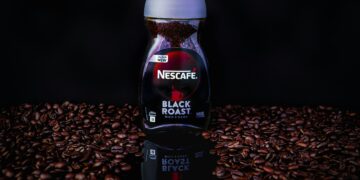Table of Contents
It was 7:15 AM on a Tuesday, and my day was already a catastrophe.
The source of the crisis wasn’t a missed deadline or an urgent email, but something far more fundamental: the sight of an empty 48-ounce bottle of SToK Unsweetened Cold Brew in my refrigerator door.
For the past five years as a consumer analyst—and a decade as a religious coffee drinker—SToK has been the non-negotiable fuel that starts my engine.
But that morning, the tank was empty.
What followed was a frantic, pre-work scramble that I think many of us know too well.
The convenience store near my house didn’t have it.
The small-format grocer a few blocks away had it, but for a price that felt like extortion.
I finally ended up at a large supermarket, grabbed a bottle, and winced as the register flashed $7.97.1
I paid it.
I needed it.
Later that day, while scrolling through my phone, I saw it: a weekly ad for Target.
SToK coffee, all varieties, on sale for $4.79.2
The feeling was immediate and visceral—I hadn’t just overpaid; I had been outplayed.
I had spent my professional life analyzing market trends and consumer behavior, yet in my own life, I was shopping like a hunter-gatherer, hoping to stumble upon a good deal.
That $8 mistake was the beginning of an obsession.
I decided to turn my professional lens inward, applying the same analytical rigor I use for client reports to my own grocery list.
The core problem, I realized, is that most of us are stuck in a reactive loop.
We see a price, we buy the product.
The standard advice—”check the weekly ad”—is a relic of a simpler time.
To truly and consistently save money on a product you buy all the time, you have to stop being a forager.
You have to become a financial analyst.
You have to understand the market for that product—its key players, its predictable patterns, and the tools that give you a strategic edge.
This is my blueprint for that transformation, using my beloved SToK coffee as our target stock.
The Epiphany: Treating Your Grocery List Like a Wall Street Portfolio
The turning point came when I laid out a month’s worth of grocery receipts next to my stock-tracking dashboard.
On one screen, I saw the predictable ebbs and flows of the S&P 500.
On my kitchen table, I saw what looked like chaos: SToK for $5.99 one week, $7.49 the next, and a rumored low price of $4.79 somewhere else.
But then it clicked.
This wasn’t chaos; it was a system of competing retail strategies playing out in plain sight.
That’s when I had my epiphany.
I needed to stop treating SToK like a simple grocery item and start treating it like a stock in a financial portfolio.
This analogy became the key that unlocked everything.
Each major retailer—Walmart, Target, Kroger—wasn’t just a store; it was a different type of “asset” with its own unique risk/reward profile.
The sales and promotions weren’t random acts of kindness; they were predictable “market movements” I could learn to anticipate.
And the world of digital coupons and cashback apps? Those were the “arbitrage opportunities”—the expert tools that allow savvy investors to exploit price differences and unlock hidden value.
This paradigm shift changed the entire game.
I stopped asking the forager’s question: “Where is SToK on sale this week?” and started asking the analyst’s question: “What is the most strategic way to acquire SToK for the lowest possible average cost over time?” This reframing moved me from reactive hunting to proactive, strategic purchasing.
What follows is the portfolio strategy I developed—a system designed to ensure you never overpay for your coffee again.
Pillar I: Mapping the SToK Ecosystem – A Deep Dive into the Major Retail Players
Before you can invest, you must understand the market.
In the world of SToK coffee, a handful of major retailers control the vast majority of the supply.
Each one employs a distinct pricing strategy, and understanding these strategies is the first step toward building your portfolio.
The Blue-Chip Stalwarts (Walmart & Target): Your Foundation for Price Stability
Think of Walmart and Target as the blue-chip stocks of your portfolio—companies like Apple or Microsoft.
Their defining characteristic is stability and predictability.
Both operate on an “Everyday Low Price” (EDLP) model, which means they aim to offer a consistently fair price without relying on dramatic, short-term sales.
This consistency gives us our most critical data point: the market benchmark.
At both Walmart and Target, the standard price for a 48 fl oz bottle of SToK hovers right around $5.97 to $5.99.4
The near-identical pricing from the nation’s two largest retailers is no accident; it establishes the effective “fair market value” for SToK.
Any price significantly above this is a premium, and any price below it is a deal.
However, there’s a subtle but crucial difference between these two blue-chips.
While Walmart’s price is remarkably stable, Target frequently offers promotions that drop the price to $4.79—a significant 20% discount off the regular price.2
This recurring sale price establishes another vital metric: the “sale price floor.” It represents the lowest price you can typically expect from a major national retailer during a standard promotion.
Strategic Role: Walmart and Target are your reliable workhorses.
If you need SToK now and no other major sales are active, they provide a fair, predictable price.
Target, with its frequent and substantial sales, is the slightly superior asset for planned purchases and sets the baseline deal you should always aim to beat.
The Dividend Payers (Kroger, Safeway, & Publix): Rewarding Loyalty & Strategic Timing
If Walmart and Target are your stable blue-chips, then traditional grocers like Kroger, Safeway, and their regional affiliates are your high-yield dividend stocks.
These stores operate on a “High-Low” pricing model.
Their everyday shelf prices are often intentionally inflated to make their weekly sales and loyalty-program discounts feel much deeper and more rewarding.
A casual shopper might walk into a Safeway, see a price of $7.49 or even $7.97 for a bottle of SToK, and walk right O.T.1
This is by design.
That high anchor price makes their promotional offers irresistible to their loyal, ad-watching customer base.
The ultimate example of this strategy is Kroger’s recurring promotion: “Save $2 each when you buy 3 or more”.9
Kroger’s base price of around $6.99 is uncompetitive against Target’s $5.99.11
But when this multi-buy deal is active, the per-bottle price drops to approximately $4.99.
This single promotion fundamentally changes the purchasing strategy.
To win at these stores, you cannot simply buy one bottle when you run O.T. The very structure of their best deals mandates a multi-buy approach.
This forces a powerful shift in behavior, moving you from “buying for the week” to “stockpiling for the month” when the market conditions are right.
Strategic Role: These stores are not for casual, single-bottle trips.
They are for planned, high-volume acquisitions timed perfectly with their promotional cycles.
Success requires monitoring their digital apps and weekly ads, and having the budget flexibility to invest in multiple bottles at once to maximize your “dividend payout.”
The Specialty Holdings & Wildcards (Aldi & Grocery Outlet): Opportunistic & Situational Plays
This final category includes the speculative, high-risk, high-reward assets in your portfolio.
Retailers like Aldi and Grocery Outlet don’t operate like traditional grocers.
As one user in a discussion forum astutely noted, their business model often involves purchasing overstock or seconds from name brands.12
This explains the wild pricing and availability swings reported by shoppers.
You might find SToK for an unbelievable $2.49 a bottle one month, and then it will completely vanish from shelves for the next six.13
The low price is a direct result of the unreliability.
You cannot build a consistent household supply chain around these stores.
This forces a critical distinction in our overall approach.
Walmart, Target, and Kroger represent “The System”—a predictable market with rules you can learn and master.
Aldi and Grocery Outlet are “The Treasure Hunt”—an opportunistic game of chance.
A comprehensive strategy needs to account for both.
Other retailers like CVS and Whole Foods also carry SToK, but the data suggests they primarily serve a convenience role rather than being price leaders.14
Strategic Role: These are your wildcard plays.
Never make a special trip just for SToK, but always check the aisle when you happen to be in an Aldi or Grocery Outlet.
If you find it at a clearance price, follow the advice of seasoned shoppers: buy all of it.
To distill this analysis into a practical tool, the following table summarizes the strategic landscape.
| Retailer | Retailer Type | Base 48oz Price | Price/oz | Common Sale Price | Key Promotion Type | Strategic Role |
| Walmart | Blue-Chip (EDLP) | $5.97 | $0.124 | N/A | Everyday Low Price | Benchmark Price; Reliable |
| Target | Blue-Chip (EDLP) | $5.99 | $0.125 | $4.79 | Percentage-Off Sale | Sale Price Floor; Best for planned, non-bulk buys |
| Kroger | Dividend (High-Low) | $6.99 | $0.146 | ~$4.99 | Multi-Buy Discount | Strategic Stockpiling |
| Safeway | Dividend (High-Low) | $7.49 | $0.156 | Varies | Weekly Ad Sale | Monitor for deep discounts |
| Aldi/Grocery Outlet | Wildcard (Clearance) | Varies | Varies | <$3.00 | Inventory Clearance | Opportunistic Treasure Hunt |
Pillar II: Unlocking Hidden Value – The Digital Arbitrage Layer
Understanding the retail landscape is just the first step.
The price you see on the shelf is merely the opening bid.
The true masters of the market know how to use digital tools to pay less than the advertised price.
This is the “arbitrage” layer, where we exploit opportunities the average shopper misses and consistently drive our cost below the $4.79 sale price floor.
Mastering the Rebate: Your Guide to Cashback Apps
The most powerful tools in your digital arsenal are cashback and rebate apps like Ibotta and Checkout 51.
These services operate independently of the store’s own sales and coupons.
You buy the product, scan your receipt within the app, and they deposit cash directly into your account.
This creates a phenomenal opportunity to “stack” savings.
For example, Checkout 51 has offered a straightforward “$2.00 Cash Back” on the purchase of a 1.42 L (48 oz) bottle of SToK Cold Brew.16
Now, consider the strategic implication.
You can go to Target when SToK is on sale for $4.79.2
You pay that price at the register.
Then, you go home and scan your receipt into the cashback App. A few days later, $2.00 appears in your account.
Your final, true cost for that bottle is just $2.79.
This is how you move from good savings to expert-level savings.
This single act of stacking a store sale with an independent rebate results in a 53% discount off Safeway’s base price and a 42% discount off Target’s regular price.
Your shopping trip no longer ends when you leave the store; it ends when your receipt has been successfully scanned.
The Modern Coupon Clipper: Maximizing Digital & Printable Offers
Alongside third-party apps, retailers themselves offer powerful digital coupons through their own loyalty programs.
Stores like Kroger and Publix have built their entire promotional strategy around their digital apps, which you must use to “clip” offers directly to your loyalty account.18
These platforms are designed to create a “loyalty loop.” To access the best deals, you must download their app, create an account, and engage with their ecosystem on a weekly basis.
This is the price of admission for their deepest discounts, like the aforementioned Kroger multi-buy deal, which is often presented as a digital-only offer.
It’s also important to distinguish between a store coupon and a manufacturer coupon.
A store promotion, like Kroger’s multi-buy deal, is funded by and exclusive to that retailer.
A manufacturer coupon, funded by SToK’s parent company, Danone, can typically be used anywhere.
While less common now, printable manufacturer coupons for SToK have appeared in the past, with offers like “$1.50 off any one STOK 48oz Iced Coffee”.20
Store policies generally prevent you from using two
store coupons on one item, but they often allow you to combine a store sale with a manufacturer coupon, and then stack a third-party cashback offer on top of it all.
This triple-stack is the holy grail of savings.
To help you get started, this table outlines the essential tools for your digital toolkit.
| Tool Name | Tool Type | How It Works | SToK Example |
| Ibotta / Checkout 51 | Cashback App | Purchase product, then scan receipt for a cash rebate. | Scan receipt to receive a $2.00 cash back offer.16 |
| Kroger App | Retailer Loyalty App | Browse weekly ads and “clip” digital coupons to your account. | Clip the “Save $2 each when you buy 3 or more” offer.9 |
| Target Circle | Retailer Loyalty App | Access exclusive weekly sales and occasional percentage-off offers. | Find the weekly ad featuring SToK on sale for $4.79.2 |
| SToK Website / Social | Brand Promotion | Follow the brand for sweepstakes and special promotion announcements. | Enter a sweepstakes for a chance to win a year’s supply of SToK.21 |
Pillar III: Timing the Market – Decoding Sales Cycles & Seasonal Opportunities
With a map of the market (Pillar I) and a digital toolkit (Pillar II), the final layer of mastery is timing.
Just like in financial markets, when you buy can be as important as where and how.
By understanding promotional cycles and seasonal trends, you can execute your purchases with maximum impact.
The Multi-Buy Anomaly: A Case Study on Kroger’s Dominant Promotion
Let’s return to the Kroger “Buy 3, Save $2 Each” deal, because it’s more than just a sale—it’s a masterclass in retail psychology.
Why “buy 3”? Why not just offer a simple sale price of $4.99? The reason is that this structure is a deliberate strategy of “forced volume.”
From the retailer’s perspective, it guarantees a higher total transaction value (nearly $15 versus $5), clears inventory off the shelves three times as fast, and builds customer loyalty.
From our perspective as strategic shoppers, it changes our relationship with the product.
By forcing a bulk purchase, the deal encourages us to build a home inventory.
This deepens our brand loyalty (we’re not going to buy a competitor’s product when we have three bottles of SToK in the fridge) and makes us less susceptible to price fluctuations between sales cycles.
The key is to recognize this mechanic and embrace it.
Plan your budget to accommodate these larger, less frequent, but far more valuable purchases.
Riding the Seasonal Wave: Pumpkin, Peppermint, and Post-Holiday Clearance
SToK, like many beverage companies, leverages seasonal flavors to drive excitement and sales.
Official listings and promotions confirm the annual release of flavors like Pumpkin and Peppermint Mocha.22
The brand even launched a “STōK PUMPKIN COLD BREW SWEEPSTAKES” in late August 2021 to kick off the season.24
These products have a defined shelf life and a limited sales window.
This creates a predictable opportunity for what I call “seasonal arbitrage.” Retailers must clear out the pumpkin-flavored items to make way for peppermint, and they must clear out the peppermint to make way for spring items.
This necessity creates a clearance window, typically in late November for fall flavors and late January for winter ones.
The strategic play is to time your purchase for the end of a flavor’s season, not the beginning.
You can often acquire these seasonal varieties for deep discounts as the store seeks to reclaim that valuable refrigerated shelf space.
The Wrexham Effect: How Brand Promotions Signal Savings Opportunities
In 2023, SToK launched a massive, multi-million dollar sponsorship of the Wrexham AFC football club, a team made famous by its celebrity owners, Ryan Reynolds and Rob McElhenney.25
The campaign included everything from renaming the team’s stadium to a Super Bowl commercial featuring Sir Anthony Hopkins.25
For the average consumer, this is just advertising.
For the strategic analyst, it’s a powerful market signal.
A company does not make an investment of this magnitude without a comprehensive plan to convert that newfound brand awareness into actual sales at the retail level.
This massive marketing spend is a leading indicator that the company will be aggressively pushing the product.
This translates directly into more frequent sales, higher-value coupons, and more prominent in-store displays designed to capitalize on the buzz.
When you see a major new SToK marketing campaign launch, it’s a signal to start paying closer attention to your local store ads and digital apps, because promotions are almost certain to follow.
Your Blueprint for a Perfectly-Priced Fridge
That frantic Tuesday morning when I paid nearly $8 for a bottle of coffee feels like a lifetime ago.
My frustration became a project, and that project became a system—a system that has kept my fridge full and my wallet happy ever since.
The journey from a reactive forager to a strategic analyst wasn’t just about saving money; it was about taking control.
My last major SToK purchase is a perfect example of the system in action.
I saw the “Buy 3, Save $2 Each” promotion appear in my Kroger App. I clipped the digital offer.
At the store, I purchased three bottles, bringing the shelf price down to about $4.99 each.
But I had also been monitoring Ibotta, which was featuring a $2.00 rebate.
After scanning my receipt, my final, all-in cost was just under $3.00 per bottle—a price lower than even the deepest clearance deals at Aldi.
I bought enough to last me over a month.
This is a repeatable blueprint, a simple set of rules that transforms how you shop:
- Establish Your Benchmarks: Know that ~$5.99 is the standard market price. Your primary goal is to always pay less than Target’s sale price floor of $4.79.
- Build Your Digital Toolkit: Before you shop, have your cashback apps (like Ibotta) and retailer loyalty apps (like Kroger and Target Circle) set up and ready to go.
- Monitor the Market: Casually check the weekly digital ads for Target and Kroger. This takes less than five minutes a week.
- Execute the Play: When a high-value opportunity appears—like the Kroger multi-buy deal or a Target sale that aligns with a strong cashback offer—execute a planned, bulk purchase.
- Play the Wildcards: Always take a quick look for SToK when you are in a “treasure hunt” store like Aldi or Grocery Outlet. You might just hit the jackpot.
This system isn’t just about saving a few dollars on coffee.
It’s about a fundamental shift in mindset.
It’s about recognizing the systems that are constantly competing for your money and learning how to make them work for you.
It’s about turning a mundane chore into a strategic win, one perfectly-priced bottle at a time.
Works cited
- SToK Not Too Sweet Cold Brew Coffee – 48 Fl. Oz. – Safeway, accessed July 22, 2025, https://www.safeway.com/shop/product-details.960192383.html
- Stock Coffe – Target, accessed July 22, 2025, https://www.target.com/s/stock+coffe
- All Deals : Cold Brew | Bottled Coffee – Target, accessed July 22, 2025, https://www.target.com/c/cold-brew-coffee-beverages-grocery/all-deals/-/N-260b3Zakkos
- Stok Cold Brew Coffee in Bottled Coffee – Walmart.com, accessed July 22, 2025, https://www.walmart.com/browse/food/stok-cold-brew-coffee/976759_1086446_1229654_4227486
- SToK Black Unsweetened Cold Brew Coffee – 48 fl oz – Target, accessed July 22, 2025, https://www.target.com/p/stok-black-unsweetened-cold-brew-coffee-48-fl-oz/-/A-50694768
- SToK products at Target, accessed July 22, 2025, https://www.target.com/b/stok/-/N-ntf9n
- SToK Ready-Made Unsweetened Black Cold Brew Coffee, Medium …, accessed July 22, 2025, https://www.walmart.com/ip/SToK-Black-Unsweetened-Medium-Roast-Arabica-Based-Blend-Cold-Brew-Coffee-48-fl-oz-Bottle/52694732
- SToK Black Unsweetened Cold Brew Coffee – 48 Fl. Oz. – safeway, accessed July 22, 2025, https://www.safeway.com/shop/product-details.960192382.html
- Stok – Jay C Food Stores, accessed July 22, 2025, https://www.jaycfoods.com/q/stok
- Stok Cold Brew, Iced & Bottled Coffee in Beverages Department – Kroger, accessed July 22, 2025, https://www.kroger.com/pb/stok/cold-brew-iced-bottled-coffee/0400300009
- Stok® Unsweet Cold Brew Slow Roast Black Iced Coffee Carton, 48 …, accessed July 22, 2025, https://www.kroger.com/p/stok-unsweet-cold-brew-slow-roast-black-iced-coffee-carton/0004127102773
- Has Aldi stopped stocking Stok cold brew? – Reddit, accessed July 22, 2025, https://www.reddit.com/r/aldi/comments/1jjhmyf/has_aldi_stopped_stocking_stok_cold_brew/
- Stok is as cheap as brewing your own? : r/coldbrew – Reddit, accessed July 22, 2025, https://www.reddit.com/r/coldbrew/comments/1873qcj/stok_is_as_cheap_as_brewing_your_own/
- Buy Stok Products at Whole Foods Market, accessed July 22, 2025, https://www.wholefoodsmarket.com/products/brands/stok
- SToK Black Unsweetened Cold Brew Coffee, 48 OZ – CVS Pharmacy, accessed July 22, 2025, https://www.cvs.com/shop/stok-black-unsweetened-cold-brew-coffee-48-oz-prodid-651062
- StoK Cold Brew Coffee coupon 70456 – Checkout 51, accessed July 22, 2025, https://www.checkout51.com/offer/StoK-Cold-Brew-Coffee-coupon70456
- StoK Cold Brew Coffee coupon 62671 – Checkout 51, accessed July 22, 2025, https://www.checkout51.com/offer/StoK-Cold-Brew-Coffee-coupon62671
- Publix Digital Coupons | Clip & Redeem In-Store Today, accessed July 22, 2025, https://www.publix.com/savings/digital-coupons
- Coupon Policy – Olney, Il – Stok Cold Brew Bold & Smooth Un-sweet Black, 48 Fl Oz (1.5 Qt) 1.42 L – Iga, accessed July 22, 2025, https://www.myiga.com/online/olneyil/pages/couponpolicy?pid=7b7f0bf2-13e6-4e82-bd91-b2680108859c&productName=stok-coffee
- $1.50 Off Any One STOK Iced Coffee Printable Coupon – Pinterest, accessed July 22, 2025, https://ca.pinterest.com/pin/457889487097042402/
- STōK® COLD BREW LAUNCHES LIMITED-EDITION WREXHAM-BRANDED BOTTLES, BRINGING ITS STADIUM SPONSORSHIP STRAIGHT TO YOUR FRIDGE – Danone North America, accessed July 22, 2025, https://www.danonenorthamerica.com/newsroom/details/stok-cold-brew-launches-limited-edition-wrexham-branded-bottles,-bringing-its-stadium-sponsorship-straight-to-your-fridge.html.html.html.html
- STōK Cold Brew Coffee Flavors, accessed July 22, 2025, https://www.stokbrew.com/cold-brew/cold-brew-coffee/
- STōK Cold Brew Coffee, accessed July 22, 2025, https://www.stokbrew.com/
- SToKPumpkinGiveaway – STōK Cold Brew Coffee, accessed July 22, 2025, https://www.stokbrew.com/stokpumpkingiveaway/
- STōK Cold Brew Coffee Replacement in Wrexham – Campaigns of the World, accessed July 22, 2025, https://campaignsoftheworld.com/ooh-campaigns/stok-cold-brew-coffee/
- Lifting the lid on STōK Cold Brew Coffee’s & Hershey’s winning advertising strategies, accessed July 22, 2025, https://www.thedrum.com/news/2024/07/16/lifting-the-lid-st-k-cold-brew-coffee-s-hershey-s-winning-advertising-strategies
- Inside the STōK Cold Brew Coffee + Wrexham AFC Partnership that usurped the tea break, accessed July 22, 2025, https://www.thedrum.com/awards-case-study/inside-the-st-k-cold-brew-coffee-wrexham-afc-partnership-usurped-the-tea-break






